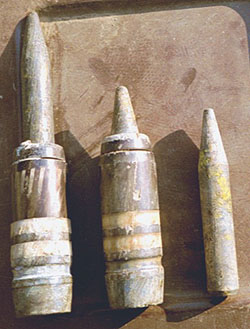Entered into the database on Thursday, March 02nd, 2006 @ 18:24:07 MST
The U.S. Army quietly placed an order for $38 million in depleted uranium
rounds last week, bringing the total order from a West-Virginia based company
to $77 million for fiscal year 2006, RAW
STORY has learned. The munition is highly controversial. While the Pentagon has been ambiguous
about its health toll, leftover rounds from the first Gulf War are believed
to have caused a significant increase in cancer and birth defects in Iraq. According
to a detailed article by the Seattle Post-Intelligencer in 2002, "Many
researchers outside Iraq, and several U.S. veterans organizations, agree; they
also suspect depleted uranium of playing a role in Gulf War Syndrome, the still-unexplained
malady that has plagued hundreds of thousands of Gulf War veterans." The new $38 million order was placed with Alliant Techsystems for 120-mm ammunition.
Once the new pact is completed the firm will have produced 35,000 rounds for
the U.S. military. The Pentagon uses depleted uranium in its rounds because they say it is extremely
effective in penetrating heavy armor. Depleted uranium remains radioactive for 4.5 billion years. The byproduct of
manufacturing nuclear weapons or reactors, the rounds contaminate water and
soil. Along some highways in Iraq where the weapon was used during in the first
Gulf War, radiation levels register 1,000 times normal background radiation
levels. Cancer levels in Iraq are attributed to the shells. A destroyed Iraqi tank in Basra destroyed by the U.S. weapon registered
2,500
times normal background radiation. Read more on depleted uranium in the Guardian here,
and from the Post Intelligencer here. In a release, the firm making the weapon said, "Its state-of-the-art composite
sabot, propellant, and penetrator technologies give it outstanding accuracy
and lethality." UPI first reported on the deal Feb.
20.
